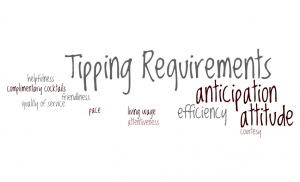Requirements for Tipping
Posted By Mike Gfeller on January 3, 2015
Anticipation. Attitude. Pace. These are just some of the traits provided by friends of mine when I asked them what conditions are present for them to tip. I am really trying to deconstruct the entire tipping experience to determine one simple answer: under what conditions, if any, would it be acceptable to tip a robot? Before you answer, think through what your conditions for tipping might be.
A friend of mine recently went on a cruise and had a robotic bartender. Her explanation was that this robotic arm was basically just programmed to mix common drinks. The thought occurred to me though that in the near future, if not already somewhere, there could be a robot bartender that could do just about anything. The logical consequence of that line of thinking is whether or not you would tip a robot. I think it comes down to whether your primary focus of a tip is to benefit you or whether it is to benefit the recipient.
For some, tipping is a consequence of the human condition where we empathize with a service provider (that is, service provider in a generic sense, which could be a waiter, waitress, bartender, or other) and want to help them improve their lot in life. Provided they don’t seriously mess up, the general consensus is that we tip at least 15% but some would say 20% or higher.
You’ll notice that none of the feedback provided indicates that a human being is required for tipping. I think we take the human part of the tipping equation for granted and yet not one person indicated a human was a core requirement for a tip. If you take a look at the words in the word cloud, a robot could certainly handle pace and would most certainly be attentive, efficient, and friendly. A robot might even be able to anticipate based on the timing of your previous requests. Certainly, all above items being considered, a robot would almost definitely qualify for receiving a tip. And yet, when I let the cat out of the bag, so to speak, and inform friends that their requirements do not preclude a robot, I’ve had a few very adamant individuals, including my wife, indicate to me that there would be no way in hell they’d tip a robot. These individuals fall into the category of those whose primary focus is to benefit the recipient. It would be hard to conclude that tipping a robot would benefit the robot, unless management indicated that the robot needed preventative maintenance in the form of tip dollars. Even then most people could care less, thinking that would be the problem of the particular establishment, not a problem of the customer.
My wife points out to me that it isn’t just a matter of improving a person’s lot in life. It is also about the interaction. I was a bartender when I was 22 and there are a lot of people that come to the bar believing the bartender is the keeper of all wisdom. It doesn’t start out that way, but after you’ve done it for awhile, you do gain a lot of knowledge about human behavior. I went to New York recently and told a story to my wife about a bartender that “had game”. She was amused that part of my recollection of my time in New York was because of the personality of that particular bartender, which is true. Human interactions do shape us in ways that are not always apparent or viewable. Could you cry in your beer to a robot? Could you talk to a robot about your relationship issues knowing the robot cannot possibly have experienced such a thing and thus has no frame of reference from which to give you advice? Sure, the advice could be programmed in, but who is the programmer? Can we trust their views on relationships? Maybe they’ve programmed an entire generation of dysfunctional robots because the robots have inherent programmer relationship bias built into them.
For others, tipping is viewed as a way to improve your situation. For example, tipping a bartender well generally means you get more attention, which translates into your glass never becoming empty. This is a big deal for some. If ultimately good service is the reason you tip, then the recipient shouldn’t care whether it is a sentient being providing that service or not. The fact that the service was received is cause enough to tip. From my own perspective, if I can get as good of service or better from a robot than from a human, I’ll tip the robot every time. From a competition perspective, it might make humans up their service game. If you are a human bartender competing in the future for tips against a stellar (or interstellar) robot bartender, you’d better come with your “A” game. Tipping robots definitely has an upside.
Let’s play out one scenario. A man walks into a bar. In this case, it is me. I look at the robot and say “What do you have on draft?” The robot runs down the list. Now, if the robot hasn’t been programmed with the latest list, the robot could be wrong, just like a human could. In this case, the robot gets it right. So then my next question is “What do you recommend?” Now, you might think the robot would be at a disadvantage with this one, but you’d be mistaken. The robot replies, “Mike right? I recognize your voice. Welcome back Mike. The last time you asked what I recommended I suggested a Velvet Hammer by Peticolas Brewery, which is a local beer. Approximately 10% of the bar patrons drink Velvet Hammer. We go through a keg every 10 days, and the last time you ordered it, I believe you liked it because you ordered 4 more after that. Sorry to be longwinded Mike, but my recommendation would be Velvet Hammer. If you’d like to try something different along those same lines, please let me know. What’ll you have?” Wow. That’s something no human could do. The best human bartenders have excellent memories and may hook you up with your favorite drink when they see you coming, but the level of data and detail above simply cannot be articulated by a human.
The bartender becomes a marketing wizard for the company. The bartender can tell them much more than they ever knew previously about personal preferences. The question is, would the patrons feel their privacy was being violated? Let’s assume for one minute that a human bartender had a photographic memory. Let’s assume the human could do exactly what the robot bartender did above in our Velvet Hammer transaction. Would there be a difference? The answer is yes. Humans may trust another human to remember (or not) a transaction, but when it comes to recording those transactions on a hard drive (even though the human brain is a hard drive of sorts), then humans become wary and suspicious. Whereas you would never go into a bar and sign a disclaimer because the bartender would store to memory whatever you say or order, you might certainly do so if a robot commits that data to storage.
Ultimately this becomes a matter of trust. The more personal the reason you choose to go to the bar, and the more human interaction you seek, I believe you will be less likely to trust and therefore tip a robot. If you are going to a bar to have a few beers with your buddies, and the robot keeps you in beer and trivia and your group has a great time then I think you may well tip a robot. I wouldn’t preclude it in any case. I’ve known a few people in my life that are binary thinkers, and I’d tip them. If you get a robot bartender named Marvin, you might want to reconsider.
Happy New Year.
-Mike






Comments
Leave a Reply